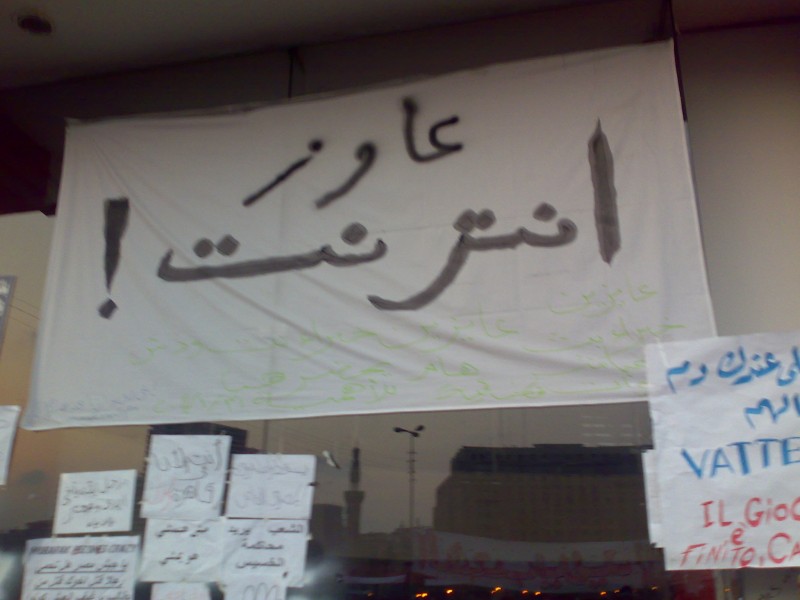Digital Citizen is a biweekly review of news, policy, and research on human rights and technology in the Arab World. Subscribe here!
For several years, Hacking Team—a Milan-based company that produces offensive intrusion and surveillance software to governments—has been a thorn in the side of digital rights activists. A 2014 paper from the University of Toronto’s Citizen Lab, which detailed how the company’s software works, relied heavily on its alleged use by Saudi Arabia to target individuals during protests in the eastern governorate of Qatif.
On July 5, the hackers were hacked, resulting in the release of a 400GB trove of documents demonstrating, among other things, that Hacking Team sold its software to repressive governments, something the company had previously denied.
“For Arab human rights defenders,” wrote Abir Ghattas shortly after the hack, the Hacking Team files confirm what they already knew: That Arab governments—including Tunisia, Morocco, Sudan, Bahrain, Egypt, and Saudi Arabia—had purchased and used Hacking Team’s remote intrusion tool, often against activists. The leaks showed that Israel’s police and defence ministry had also considered purchasing the software.
A debate centered on whether the export of such technologies should be controlled by the states in which they are produced has been ongoing for several years, with proponents arguing for export regulations and opponents claiming that such regulations could curb online freedoms. While that debate is sure to continue, one thing is certain: Repression, once mainly the domain of governments, has become a multi-million dollar industry and governments, the would-be regulators of these tools, have now become its customers.
Algeria
The Algerian police’s specialized cybercrime units in the southern city of Ghardaia summoned and arrested 27 Facebook users for investigation over charges of incitement. The users stand accused of inciting violence and hatred between Arab and Berber communities through a number of Facebook pages including “Ghardaia HD3”. The arrests followed clashes between the two ethnic communities in Ghardaia in early July, which resulted in twenty-two deaths and dozens of injuries. Police allege that evidence they obtained proves that the recent clashes were provoked by a group of persons who published rumors, lies and fake photos on Facebook pages and online forums.
On 2 July, authorities released labor rights activist Rachid Aouine after spending four and half months in jail. Aouine was arrested in March and sentenced to six-months in jail for “instigating an unarmed gathering” in an ironic Facebook update. The sarcastic post responded to a government announcement warning law enforcement officers not to take part in protests. Aouine wrote: “Police officers, why don’t you go out today to protest against the arbitrary decisions against your colleagues…, instead of controlling the free activists and the protesters against the shale gas?”
Bahrain
Human rights activist Nabeel Rajab was released from prison on 13 July, after receiving a royal pardon. Rajab was arrested at his home on 2 April for tweeting about abuse in Bahrain's Jaw Prison and the Saudi-led war against Houthi rebels in Yemen. While in detention, a court upheld a six-month jail term against him in the separate case of insulting security institutions on Twitter.
On 11 July, Bahrain handed over Kuwaiti citizen Yousef Shamlan Al-Essa to his country. Al-Essa stands accused of “spreading false news” for taking part in conversations hosted by a WhatsApp group called “Fontas”. In the conversations, the group accused judges at the constitutional court of receiving bribes.
Egypt
Under a new terrorism bill, journalists in Egypt could face up to two years in jail if they report non-government statistics. Article 33 of the law bans the publication of “false news or data about any terrorist operations that contradicts the official statements released by the relevant authorities”. The bill is set to be approved by President Abdel Fatah al-Sisi and has been criticized by rights groups in the country.
On 14 July, police raided the offices of Yaqeen News Network, arresting its director Yahia Khalaf, along with Ibrahim Abubaker, another employee of the network. Police also confiscated all of the network's equipment and devices. While Abubaker was released, Khalaf remains in detention.
Iraq
Iraq’s government ordered a complete shutdown of Internet services in the country to prevent cheating during the national exams for entry into junior high school. The shutdown lasted for three hours between 5am and 8am on 27 June. A one-hour outage was recorded on 29 June, but may have been connected to network testing.
Jordan
Ghazi Mrayat, a journalist at the state-owned daily Al-Rai, was sentenced to 15 days in jail by the state security court for violating a gag order in relation to a foiled terror plot allegedly backed by Iran. According to the Committee to Protect Journalists, on 6 July, Al-Rai published on its website an article written by Mrayat, claiming that a suspect of Norwegian and Iraqi citizenship had been arrested with nearly 100 pounds of explosives. On 8 July, the newspaper published a follow-up article also written by Mrayat, with more details about the suspect and the Iranian link to the plot.
Lebanon
SMEX reports that mobile phone users in Lebanon are being charged for a service they didn’t request, and forced to pay even more than the cost of one month of that service to cancel. The digital rights group offers suggestions to telecoms on how they can respect users and their privacy.
Annahar enumerates 22 reasons behind slow internet speeds in Lebanon. According to the newspaper which quoted an official at the state run Ogero Telecom, in most cases these reasons are linked to the customer and not the provider such as age of the computer, opening several tabs and applications at the same time or not updating the software.
Morocco
On 2 July, a primary court in Rabat delayed the trial of Khalad Boubakri and Ibrahim Safi, journalists at the news site barlamane.com who are facing trial for their role in a nepotism scandal involving the Minister of Higher Education Lahcen Daoudi. The minister filed a defamation lawsuit against the site for publishing articles alleging that he exploited his position to appoint members of his party at Moroccan universities.
Oman
Activist Ahmed Al-Moghairi spent three weeks in solitary confinement after Oman’s Internal Security Service summoned him for investigation on 16 June. He was released on 9 July. The Gulf Center for Human Rights believes that Al-Moghairi was detained for discussing corruption and calling for democratic reforms on social media.
Palestine
In a recent article, 972mag exposes the double-standards of Israeli authorities with respect to inciting speech online. While Palestinians often face imprisonment or house arrests for petty acts such as sharing the logo of the Popular Front for the Liberation of Palestine, Israelis do not face repercussions for “racist and inciting Facebook statuses” which have become “commonplace”. According to 972mag, “not a single Israeli has ever been sent to prison for publishing a status on social media.” The article points to the recent case of Uday Biyumi, a 23-year-old Palestinian from Jerusalem, sentenced to seventeen months in prison for publishing Facebook posts “systematically and widely.” The authors also note: “The court takes into account how much exposure these statuses receive when determining the defendant’s sentence.”
Syria
On 8 July, the ISIS-affiliated “Cyber Army of the Caliph” hacked the website of the Syrian Observatory for Human Rights and threatened its director, Rami Abdelrahman. The observatory documents human rights violations by all warring parties in the ongoing conflict.
Tunisia
Noureddine Mbarki, editor-in-chief of the news site akherkhabaronline.com, is accused of “complicity” under Article 18 of the country’s 2003 counter-terrorism law for publishing on his site a photo showing Sousse terror attacker Seiffeding Rezgui leaving a car right before killing 38 foreign tourists on a beach resort on 26 June. The photo, which was published on 5 July, has since been taken down at the request of the authorities. Prosecutors are seeking the source of the photo.
On 3 July, the Tunisian government withdrew the draft law on the right to access information without explanation. The draft was submitted to the National Constituent Assembly last year was only awaiting to be presented to the plenary of the People’s Representatives’ Assembly for its final approval. Article 19 described the withdrawal of the bill as “a step in the wrong direction”.
United Arab Emirates
The UAE jailed and deported Australian artist Jodi Magi for posting on facebook a photo of a parked car blocking two disabled parking spaces outside her apartment block in Abu Dhabi. Magi, who spent 53 hours in custody before her deportation, was convicted of “writing bad words on social media about a person”.
New research
- Recent research indicates that state violence and internet shutdowns go hand-in-hand in Syria.
- Women Journalists Without Chains released a report documenting media freedom violations during the first half of 2015 in Yemen.
In other news
- The global privacy community lost two of its fiercest advocates in the past two weeks. British privacy activist Caspar Bowden, who had fought to ensure global privacy rights for all, passed away on July 9. Turkish activist Dr. Özgür Uçkan, a co-founder digital rights group Alternatif Bilisim, passed away on July 10. Both will be sorely missed.
- Europol will form a new Europe-wide police team to combat the online presence of Islamic State (IS) beginning in July. The police team will work with social media platforms to track and block social media accounts linked to IS and aims to shut down any new accounts within two hours of their creation.”
- From her prison cell, Egyptian photographer Esraa Al-Taweel writes about the last days before her arrest and what she has witnessed in prison since her detention.
- Mohamed ElTaher explains the capabilities of RCS technology used by Egyptian authorities after news of Hacking Team exporting the technology to the Egyptian government.
- ICANN’s Rafik Dammak discusses the current debate around the Domain Name System (DNS) and why activists should get involved in ICANN’s work.
- Digital Citizen contributor Mohammed Tarakiyee writes about the feminist practice of digital security in the MENA region.
- The UAE and the US launched the Sawab Center to counter the online propaganda of ISIS.
From our partners
- EFF has published a report on how Microsoft Bing censors search results in the Middle East.
- Access submitted a letter to Iraqi authorities calling on the country to stop shutting down the Internet.
Upcoming events
- The Stockholm Internet forum will take place October 21-22, 2015.
Digital Citizen is brought to you by Advox, Access, EFF, Social Media Exchange, and 7iber.com. This month’s report was researched, edited, and written by Afef Abrougui, Fahmi Albaheth, Jessica Dheere, Mohamed ElGohary, Mohamad Najem, Dalia Othman, Courtney Radsch, Thalia Rahme, Hayat Rim Chaif, Mohammed Tarakiyee, Amira AlHussaini, and Jillian C. York, and translated into Arabic by Mohamed ElGohary and French by Thalia Rahme.




